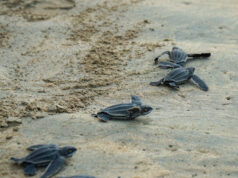 LONDON—Leading third-party certifier SCS Global Services (SCS) announced the release of a groundbreaking Life Cycle Assessment (LCA) comparing the environmental performance of 10 different raw material sources of manmade cellulose fiber (MMCF). The study examined a broad range of environmental issues, from the time raw materials are obtained from global forests, agricultural operations or other sources, through the production of viscose (also known as rayon) and other MMCFs. Commissioned by luxury designer, Stella McCartney, the report is being made publicly available as a resource for all brands, designers and retailers interested in making informed fiber sourcing choices.
LONDON—Leading third-party certifier SCS Global Services (SCS) announced the release of a groundbreaking Life Cycle Assessment (LCA) comparing the environmental performance of 10 different raw material sources of manmade cellulose fiber (MMCF). The study examined a broad range of environmental issues, from the time raw materials are obtained from global forests, agricultural operations or other sources, through the production of viscose (also known as rayon) and other MMCFs. Commissioned by luxury designer, Stella McCartney, the report is being made publicly available as a resource for all brands, designers and retailers interested in making informed fiber sourcing choices.
This is the first study using LCA, an internationally recognized scientific methodology, to assess global sourcing scenarios for all 10 raw materials, including an evaluation of specific forests of origin and terrestrial and freshwater ecosystems. The study included MMCF sourced from different global forests, eucalyptus plantations, bamboo, cotton-linters, flax fiber and recycled clothing.
“This is the most comprehensive LCA published evaluating the environmental performance of manmade cellulosic fibers,” said Tobias Schultz, who headed up the project team for SCS as its Manager of Corporate Sustainability Services. “We applied the latest science and data, based on a standardized LCA Methodology, to complete the evaluation, which was then peer-reviewed by a multi-stakeholder panel of experts. This level of scrutiny ensures that the report’s findings are robust and reliable.”
Fiber Made from Belgian Flax a Favorable Option
The study concluded that the choice of raw material input is key to determining the environmental profile of MMCF. While none of the 10 raw materials or global sourcing scenarios were environmentally preferable across all impact categories, MMCF made from Belgian flax emerged as favorable across a majority of the impact categories, followed by viscose produced from recycled clothing. The analysis found that Asian production from Canadian boreal forest pulp, Chinese production from Indonesian rainforest pulp, Chinese production from Indonesian plantation pulp, and Indian cotton linter pulped in China had the heaviest environmental footprints among the scenarios examined.
The Stella McCartney brand is deeply committed to sustainability and this study ensures the brand that its own MMCF products are free from fibers derived from ancient and endangered forests. Furthermore, the information provided in this study will be a resource for the entire industry as it provides insights into wide range of impacts that a brand’s or supplier’s sourcing of manmade cellulose fibers can have on the planet’s forests. The study incorporates the most up-to-date, scientific information, emphasizes the criticality of businesses embracing closed-loop fiber solutions.
Representatives from Price Waterhouse Cooper (PWC), the Smithsonian Tropical Research Institute, the Copernicus Institute of Sustainable Development at Utrecht University, and the environmental not-for-profit organization, Canopy, participated on the peer review panel. The LCA was conducted in conformance with internationally recognized ISO 14040 and 14044 LCA standards, the draft LEO-S-002 standard, and the Roundwood Product Category Rule (PCR).
‘Important New Insights’
“This rigorous study provides important new insights into how the choice of fiber source determines the impacts of man-made cellulose fiber on the world’s species, forest ecosystems and freshwater, as well as our global climate and human health.” said Nicole Rycroft, Canopy’s Executive Director. “For Canopy, these findings reinforce the need to prioritize and advance commercial-scale production of fabrics made from closed-loop fiber solutions such as agriculture residues and recycled fabrics.”
According to Schultz of SCS, the cutting-edge study addressed a comprehensive set of impact categories relevant to MMCF production, factoring in critical yet previously omitted impact categories such as ocean acidification, climate hot spot impacts, forest disturbance, and key species losses. Land use conversion and species impacts were studied using innovative methodologies and transparent, publicly available data. The global sourcing scenarios selected are representative of a variety of real-world options. Three of the sourcing scenarios are in areas that fall under Canopy’s definition of ancient and endangered forests and are therefore important to note for the 105 global-fashion and apparel brands signed onto the CanopyStyle initiative.
On November 30, SCS Global Services will host a webinar with Schultz presenting key findings from the Life Cycle Assessment (LCA) study. This webinar will discuss the details of the study, providing an overview of the key findings, methods, and data sources used, enabling personnel at brands, designers, and retailers to make more informed fiber sourcing choices. Click here to register.







